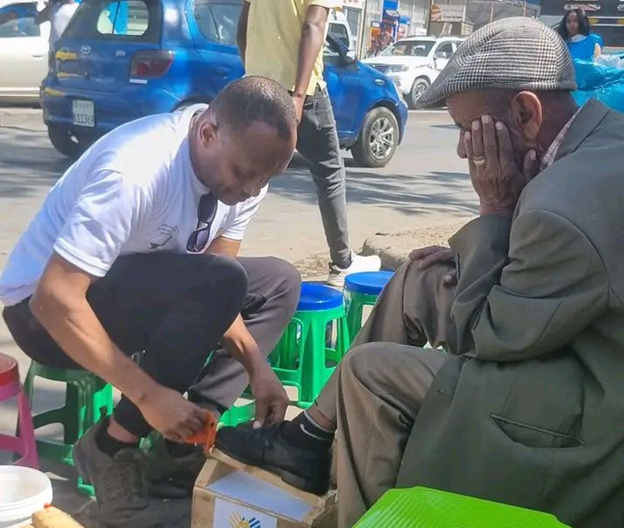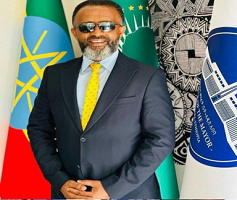
As Easter approaches, efforts are underway across the country to ensure that disadvantaged members of the society can celebrate the Festival joyfully. In Addis Ababa, the City Administration has extended support to hundreds of thousands individuals facing economic and social hardships. According to Mayor Adanech Abiebie, sharing meals is a powerful mechanism that symbolizes love, togetherness and fosters a harmonious relationship within the community.
In Ethiopia, aside the usual day, holidays hold a deep significance, often serving as a time to promote unity and compassion. Supporting the less fortunate is a deeply rooted value that embodies this spirit of togetherness. In addition to government-led initiatives, these days an increasing number of individuals are volunteering their time, energy and resources to help those in need. Among these, Taye Worku is the one.
Taye is an event Manager, Master of Ceremonies (MC), the Smile Train Ambassador and dedicated humanitarian who plays a significant role in supporting those in need. His passion to support the needy has never been confined only in holiday seasons. He is always willing to stretch his hands to the orphans, the widows, the impoverished and vulnerable members of the community.
As an MC and event organizer, Taye leads a busy professional life. However, there was no time that he refrained from engaging in humanitarian activities and helping the poor and children in need
His commitment to helping others is part of his daily routine, gaining even more momentum during holidays, offering both financial and material support moving from doors to doors. Guided by his personal motto, “Sharing is Gaining,” Taye’s career has opened doors to collaborate with numerous humanitarian organizations operating in Ethiopia. His childhood dream of making a difference in the lives of others continues to inspire his efforts today.
According to him, supporting the needy should not be left only to the government, some individuals, or non-governmental humanitarian organizations. It must be the shared responsibility of everyone. Taye has a firm belief that happiness must be contagious. We must feel the pain of others while we pursue our joy. “We are never truly happy until all of us are happy. That is my principle. An individual might drive a fancy car or live in a luxurious house; but their happiness cannot be complete if they are surrounded by people who are starving, have nothing to eat and go to bed on empty stomach,” he remarked.
And Taye is practically demonstrating his commitment in areas of humanitarian support by helping widows, mothers with sick or disabled children, people with disabilities, orphans and others in various forms. Whether it is from his own pocket or by coordinating efforts with others, his contributions have been wide-ranging. These include providing wheelchairs, buying or renting houses, supplying food, delivering academic materials to students, covering medical expenses, donating important items that can help individuals to start small businesses; thereby escape free from the cycle of poverty.
According to Taye, humans are born to live in harmony with dignity, and this harmonious existence can be expressed through helping one another. Every religion teaches the importance of goodness, love, and supporting others. This golden rule must be practiced by every individual. “We all need to understand others’ pain and grief. We should treat others the way we want to be treated. There are many Ethiopians living in poverty, and these people are our responsibilities. We should show them compassion not only during holiday seasons but in every situation. In that context, I believe that the more we help others, the more we maximize our inner peace,” Taye remarked.
In relation to the Easter celebration and helping others, Taye said “Easter is a holiday that God showed His unreserved love to the whole world by sacrificing His only begotten Son- Jesus Christ. This ultimate sacrifice of God teaches us what love and compassion truly mean. God sacrificed His only son. This is a great lesson for each one of us. We must learn to share not only from the extra we have. As Christians, we must ask ourselves “What would Jesus do if He found a person suffering from hunger and starvation? In this regard, we must replicate the deeds of Jesus.”
When asked what is needed to help others, Taye said that having a kind heart, like that of Jesus, is more than enough to help others. “A person with a generous heart is truly rich. Because, a person with kind heart has the empathy to understand the pain and suffering of others and is always ready to stretch a helping hand.”
Taye also advised that helping the poor should not be confined to a one-time effort or limited to specific occasions; rather, it should be addressed through systematic, sustainable, and coordinated efforts. Proper resource allocation, the creation job opportunities for the youth and identification of the root causes of poverty are key approaches to addressing the problem. Ethiopia is a land blessed with fertile soil. Effective utilization of this resource does not only ensure food security, but also creates meaningful benefits for several Ethiopian youth.
“The fight against poverty requires the collective effort of governments, non-governmental organizations (NGOs), and individuals to bring about lasting change. It is crucial to acknowledge the issue of unequal wealth distribution, as it continues to perpetuate cycles of poverty and limits opportunities for social mobility.”
Likewise, initiatives such as “Yelemat Tirufat” (Bountiful of Basket) should be encouraged, as they not only provide essential food supplies to vulnerable communities but also generate job opportunities, fostering economic independence and strengthening community resilience. Such projects exemplify how targeted intervention can address immediate needs while also simultaneously contributing to long-term sustainable solutions.
Moreover, addressing underlying issues, such as reproductive health and family planning policies, is crucial in combating poverty sustainably. By ensuring access to education and resources that empower individuals to make informed decisions about reproduction, communities can break the cycle of poverty that often spans generations.
Collaborative efforts must also include educational programs that promote awareness about financial literacy, vocational training, and entrepreneurship to equip individuals with the skills necessary to improve their economic standing and build sustainable livelihoods.
Most importantly, comprehensive policy interventions, combined with grassroots initiatives, can create a multi-faceted approach to eradicating poverty. It is imperative that this issue remains a priority beyond one-off charitable actions; instead, it should be an integral part of our societal values and governance. “A sustained commitment to fighting poverty, with a focus on addressing wealth inequality and the implementation of holistic programs, will pave the way for a more equitable society where every individual has the opportunity to thrive. Together, through consistent and coordinated efforts, we can combat poverty effectively and create a brighter future for all,” Taye remarked.
BY LEULSEGED WORKU
THE ETHIOPIAN HERALD SATURDAY 19 APRIL 2025





